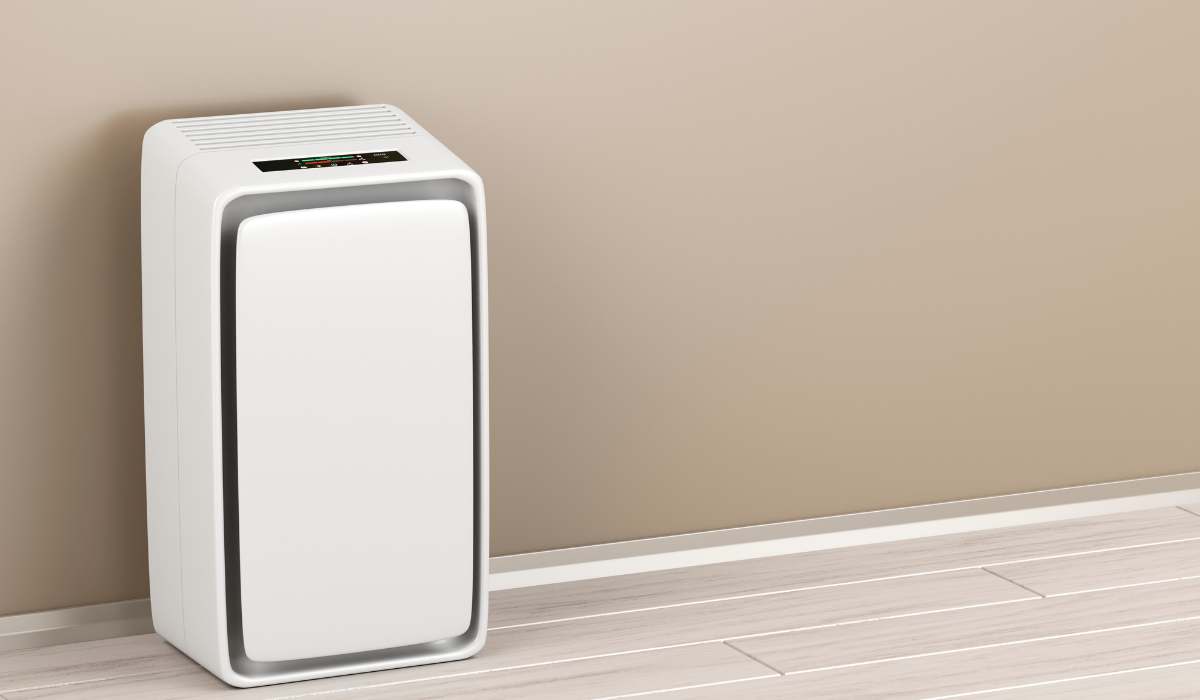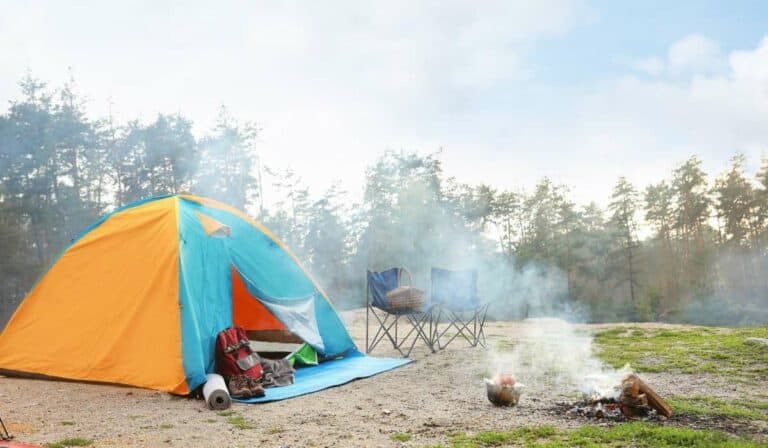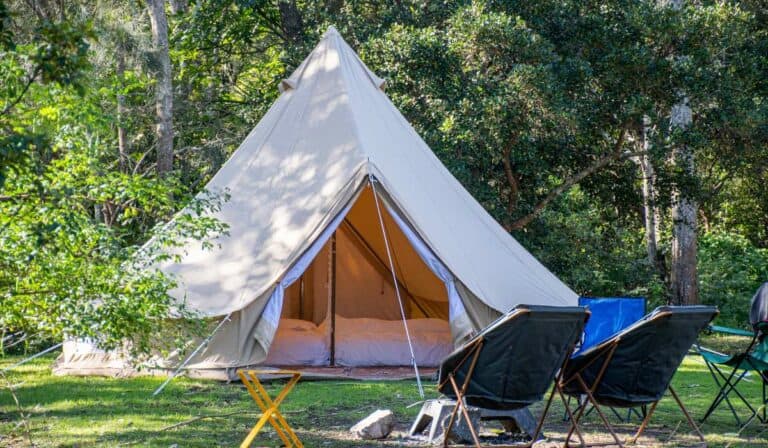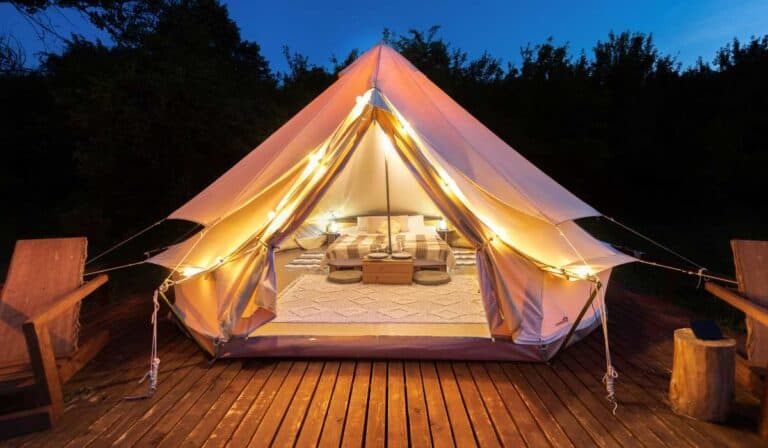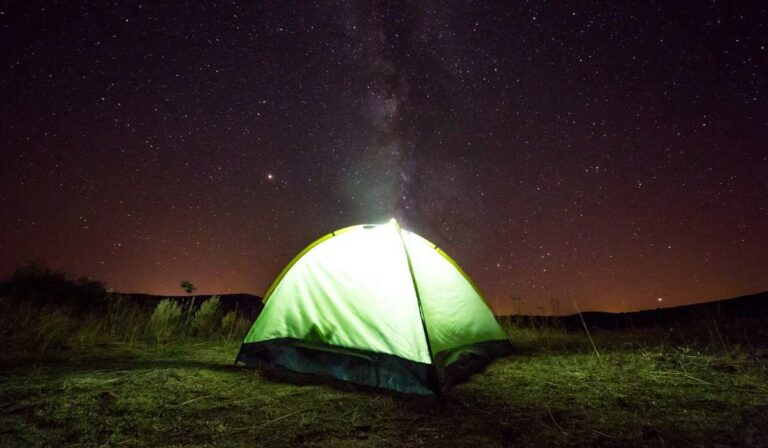Best Portable Air Conditioners for Camping: Ultimate Guide
Camping doesn’t have to mean sacrificing every modern convenience. When you want to enjoy the great outdoors during the hot summer months a portable air conditioner designed specifically for camping is the answer.
This comprehensive guide has everything you need to know about air conditioners specifically designed for tent campers and outdoor enthusiasts.
We’ll go over what features to look for when choosing a portable air conditioner, discuss some of the top brands in the market, and guide you on how to set up and maintain your unit once you’ve purchased it. There’s even a troubleshooting section to address common issues that sometimes crop up with these cooling systems.
So prepare to stay cool during those hot summer nights and read on.
Table of Contents
1. Benefits of Portable Air Conditioners for Camping
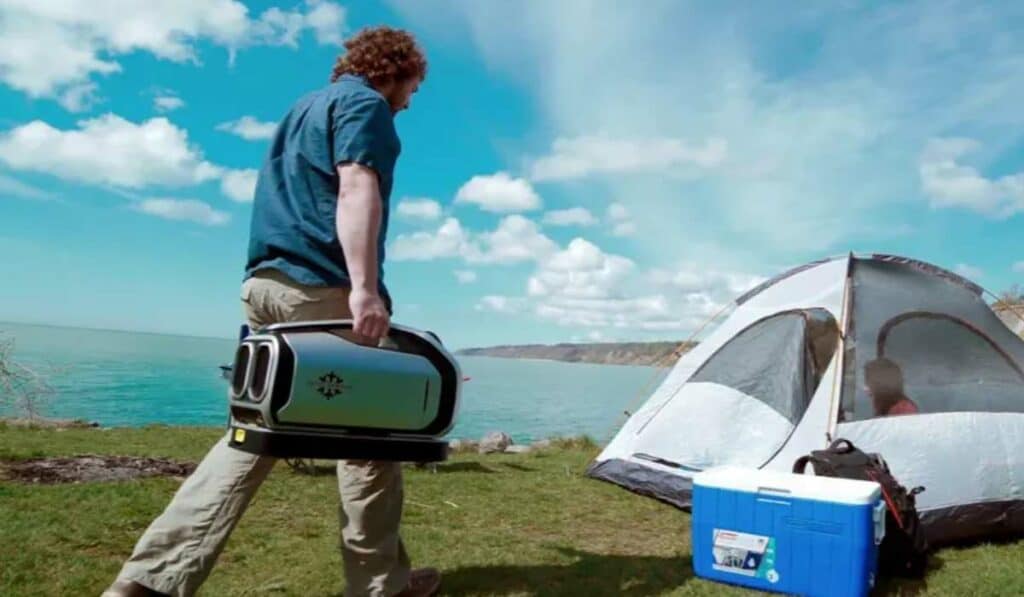
Portable air conditioners extend your personal camping season by making enjoying the great outdoors possible even during the summer when temperatures climb. These compact cooling devices offer a variety of benefits that make them worth considering purchasing.
A Comfortable Sleeping Environment
Portable air conditioners help you maintain a comfortable temperature inside your tent throughout the night. A cool night’s rest means you wake up refreshed and ready for outdoor exploration and adventure.
Ventilation and Dehumidification
Many portable air conditioners have built-in dehumidifiers. This removes excess moisture from the air while simultaneously increasing your tent’s overall ventilation. In addition to keeping you cool, there’s the added perk of preventing mold from growing inside the tent. Especially on extended trips, the added hygiene and health benefits make having a portable air conditioner a no-brainer.
Variety of Cooling Capacities
A wide range of BTU options available means finding a portable air conditioner that fits your tent size is easy. You won’t need to worry about purchasing more than you need or your tent not being cool enough as long as you select a unit with an appropriate BTU range.
Eco-Friendly Options Available
- Solar-powered models: Whether you are eco-conscious or just want to be totally off-grid, solar-powered portable AC units allow you to be both. They harness energy directly from sunlight without relying on electricity.
- Battery-operated models: Battery-operated portable air conditioners are another eco-friendly alternative that allows you to enjoy cool air without plugging into the electrical grid. Just remember to bring extra batteries.
Portability and Easy Setup
Their small size and lightweight construction make portable air conditioners convenient to carry, even to the most remote camping spots.
Setup tends to be quick and hassle-free, particularly with battery-operated models. That means you’re minutes away from cooler air once you get the unit unpacked.
What to Look For in a Portable Air Conditioner
There are several general considerations to keep in mind when selecting a portable air conditioner for your camping trip. We’ve listed these below to help you choose the right unit for your needs.
Size and Weight
Size and weight are arguably the most important considerations when it comes to choosing your portable air conditioning unit. Since you’ll be carrying it at least from the car to your campsite, it’s essential to find one that’s lightweight and portable. Look for models that have handles or wheels for added convenience.
Cooling Capacity (British Thermal Units)
An air conditioner’s ability to cool the air is measured in BTUs or British Thermal Units. The higher the BTU rating, the colder the unit can make the surrounding air. So you’ll need to consider how large your tent is as well as how warm on average it’s expected to be at your camping destination. As a general rule, however, a unit needs at least 20 BTUs per square foot to cool an area.
Below is a useful BTU guideline:
- Small: For tents up to 150 square feet., look for units with around 5,000-8,000 BTUs.
- Medium: For spaces between 150-300 square feet., the unit needs to have between 8,000-12,000 BTUs.
- Large: If your tent or RV measures over 300 square feet, choose an air conditioner rated at least at 12,000+ BTUs.
Power Source
The type of power source a portable air conditioner unit needs is another crucial consideration. If your campsite won’t have electrical outlets, you’ll need a battery-operated or solar-powered portable air conditioner. So be very certain about the access to electricity on your camping trip before choosing what portable air conditioning unit to buy.
Battery-Powered versus Electric Models
- Battery-powered: These units are extremely portable but may not provide as much cooling power compared to electric models since they’re limited by the life of the battery.
- Electric models: These units usually have more cooling power but require access to an electrical outlet, something not available on a camping trip.
If you are RV camping you’ll still need to select a portable air conditioner with an appropriate power source. Some units require a standard 110V outlet while others can be connected to your vehicle’s power system. Make sure the unit you select is compatible with your available power sources.
Built-In Dehumidifier
Built-in dehumidifiers have two awesome benefits. In addition to reducing moisture in the air and offering relief from more sticky, humid environments, they also help prevent mold or mildew from growing in your tent. Another related feature to look for is a built-in air purifier.
Noise Level
Lastly, consider the noise level of the portable air conditioning unit. Most modern models are relatively quiet, but some can still produce noticeable noise that may keep you from getting a good night’s sleep. Check the decibel ratings – the lower the better – or other user reviews to get a sense of how loud a portable air conditioner unit is. Some units may even have a quiet mode that can be selected.
Keeping these factors in mind when shopping for your portable air conditioning will ensure you get the right unit for your needs.
Energy Efficiency
Energy efficiency is essential when camping since electrical supply or power resources can be limited. Look for models with high Energy Efficiency Ratio (EER) ratings. Some units also have energy-saving features like programmable timers, sleep mode, and adjustable fan speeds.
Click here to read about Best Beach Camping in San Diego
2. Top Portable Air Conditioner Brands
Few things are more important when it comes to portable air conditioning units than how reliable and efficient they are. With so many options available, it’s important to select a unit made by a well-respected brand that’s already known for producing portable air conditioners designed specifically for tent camping.
Zero Breeze
Zero Breeze is known for its innovative outdoor cooling solutions. Their flagship unit is the Mark 2 battery-powered portable air conditioner. Its compact size and extended battery life of up to five hours make it a perfect choice for any camping trip.
Frigidaire
Already an established household appliance brand, Frigidaire also offers a range of powerful yet compact portable air conditioners suitable for camping trips. Many of their units have features like multiple fan speeds, dehumidifiers with different modes, and even remote control-operated models. The versatility of their portable air conditioner models makes it a brand worth exploring.
Honeywell
Honeywell, another well-known brand in the home appliances space, offers several models of portable air conditioners ideal for tent camping enthusiasts. Anyone familiar with Honeywell’s advancements in the thermostat space won’t be surprised to learn their portable air conditioner units also come with some pretty advanced features. The energy-efficient units come equipped with advanced features like built-in dehumidifiers, air filters, and adjustable fan speeds.
Black+Decker
Black+Decker may be better known for power tools and some home appliances, but the brand also offers a line of portable air conditioners perfect for camping. Their units are easy to set up, have user-friendly controls, and have efficient cooling capabilities. They are a great choice for any camp trip.
3. Tips for Setting Up Your Portable Air Conditioner

It’s important to properly set up your portable air conditioning unit in order to get the best use out of it and keep it in working order. Below are some tips to keep in mind when setting up camp with a portable AC unit.
Choose the Right Location
Find the right spot inside your tent or RV. Look for an area that has ample space, good ventilation, and easy access to any needed power sources. Make sure there’s plenty of space around the unit so airflow isn’t restricted.
Ensure Proper Ventilation
Your unit needs adequate airflow to ensure optimal functioning and avoid overheating. Both the intake and exhaust of your portable AC unit need to be unobstructed. If using the unit for tent camping, consider purchasing a model designed specifically for tents. Also, use any vent attachments provided by the manufacturer.
Connect Power Source Safely
- If using an electrical outlet at a campsite: Confirm that you’re plugging into an appropriate voltage source as specified by the manufacturer.
- If relying on battery power: Check that batteries are fully charged before heading out and always carry spare batteries.
- If solar-powered: Set up the solar panels according to their instructions. Check for any additional equipment required, like charge controllers or inverters, before heading out on your trip.
Adjust Settings Accordingly
After turning your unit on, don’t forget to adjust settings like temperature control or fan speed according to your preferences. You may also need to set the unit on sleep mode or use a built-in timer. Don’t forget to periodically check on the unit throughout your camping trip to make sure it’s still working properly.
Keep an Eye on Condensation
Some portable air conditioners may produce condensation that needs to be managed properly. While some models have a built-in water reservoir, others require external drainage solutions like hoses or buckets. Always follow the manufacturer’s recommendations for managing excess moisture.
Click here to read about Using Airbnb for Tent Camping
4. Maintaining Your Portable Air Conditioner
Regular maintenance can prolong the life of your unit, save energy, and prevent potential issues from arising. Here are some handy tips on how to maintain your portable air conditioner so it’s always working optimally during your outdoor adventures:
Clean or Replace the Filters Regularly
The filters in a portable air conditioner keep the airflow clean and free from dust particles. Dirty filters reduce the unit’s efficiency and cause poor performance. Clean or replace filters regularly, following the manufacturer’s recommendations.
- For reusable filters, remove them carefully from the unit and gently wash them with warm water mixed with mild detergent.
- Rinse thoroughly before allowing them to dry completely before reinserting them into the unit.
- Replace disposable filters as needed according to their stated specific lifespan, which is usually about three months.
Inspect Exhaust Hose Connections
A secure exhaust hose connection ensures that hot air is properly vented outside of your tent or RV. Periodically check for loose connections between the exhaust hose and both ends of the unit itself. Tighten any loose fittings as necessary.
Clean Condenser Coils Periodically
The condenser coils in your portable air conditioner release heat from the unit. Over time, dust and debris accumulate on the coils and reduce the portable air conditioning unit’s efficiency. Clean the condenser coils periodically using a soft brush or vacuum cleaner with a brush attachment.
Drain Water Reservoir Regularly
Some portable air conditioners come with a water reservoir that collects excess moisture during operation. It’s essential to drain this reservoir regularly to prevent overflow and potential damage to your unit or camping area. Always follow the manufacturer’s instructions when draining the water tank.
Store Your Portable Air Conditioner Properly
When not in use, store your portable air conditioner in a cool and dry place away from direct sunlight or extreme temperatures. Keep it covered to protect it from dust or any other elements.
5. Troubleshooting Common Issues with Portable Air Conditioners
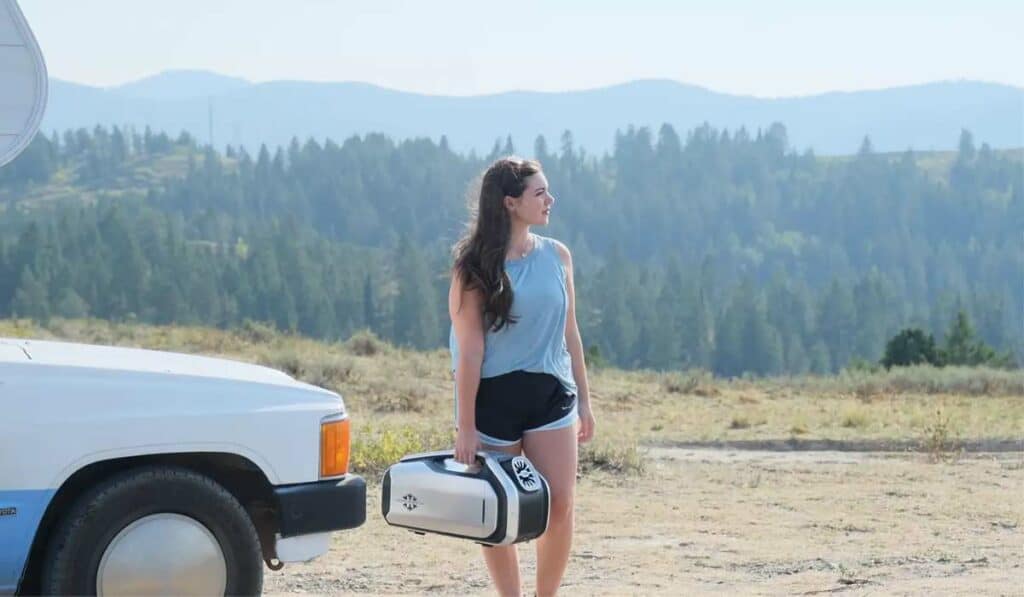
For those hopefully rare times your portable air conditioning unit isn’t operating at its best, try the following troubleshooting suggestions.
Unit Not Turning On
If you’ve already confirmed that the power source is functioning properly, check if a fuse or circuit breaker has blown or tripped. Resetting the breaker or replacing the fuse might resolve this issue. Of course, this only applies to portable air conditioners that use an electrical outlet or vehicle for their power.
Insufficient Cooling
IF portable AC isn’t cooling as much as it should be, consider these possible reasons:
- Incorrect Size: Ensure that your AC unit has adequate BTUs (British Thermal Units) for the size of your tent or RV space. A smaller unit will struggle to cool larger spaces effectively.
- Clogged Filters: Dirty filters can restrict airflow and reduce cooling efficiency. Check and replace the filters if necessary.
- Poor Ventilation: Proper ventilation is crucial for your unit to work well. Ensure exhaust hoses are not obstructed and vents have enough clearance from walls or other objects.
- Ambient Temperature: Keep in mind most portable air conditioners work best when outdoor temperatures range between 62°F – 95°F (17°C -35°C). Extreme heat may cause the performance of the air conditioner to decline.
Water Leaks
Water leaks can occur due to the portable air conditioning unit not being set up correctly or a full condensate tray. First, make sure the unit is level and the drain hose is properly connected. Periodically drain the internal water reservoir of your portable air conditioner so it does not get overfilled.
Unusual Noises
If you notice strange noises coming from your AC unit, check for any loose parts or debris caught inside the vents/filters. The noise may stem from these vibrating while the unit is on. Also, make sure that all screws are securely tightened securely and that there are no obstructions near the exhaust vent.
Error Codes on Display Panel
Some portable air conditioners have digital displays that show error codes when something is wrong with the system. A list of common error codes can be found on Compact Appliance. Refer to the user manual for specific troubleshooting steps related to these codes. If necessary, you may need to contact the unit’s customer support services.
Click here to read about Ultimate Guide to Tent Camping in Texas
FAQs about Portable Air Conditioners for Camping
What is the Best Portable AC for a Tent?
The best portable AC for a tent is the Zero Breeze Mark 2. It’s compact, lightweight, and specifically designed for outdoor use. With its dual-hose system and energy-efficient operation, it provides optimal cooling performance in tents without using too much power.
Are Portable Air Conditioners Good for Campers?
Yes, portable air conditioners are a great camping accessory since they provide efficient cooling while being portable and easy to set up. They keep tents or RVs cool during the hot summer months.
What Kind of Air Conditioner Can I Use in a Tent?
Both battery-powered and electrically powered portable air conditioners can be used in tents. Battery-powered units like the Zero Breeze Mark 2 are conveniently portable. Electrically powered models require access to an electrical outlet or generator but also often provide more powerful cooling.
What are the Disadvantages of Portable Air Conditioners?
The main disadvantages of using a portable air conditioner include limited cooling capacity compared to traditional window units or central systems, higher noise levels, and potentially needing to drain them frequently. You’ll also increase your energy consumption if using them for long periods of time.
Now you know exactly what to look for in the perfect portable air conditioning unit for your tent or RV camping needs.
Head over to SunWaterDirt.com where you’ll find high-quality camping gear and equipment at affordable prices. Of course, SunWaterDirt.com has a great selection of portable air conditioners that provide efficient cooling while still being budget-friendly.
Visit SunWaterDirt.com today and start preparing for your next camping trip!

